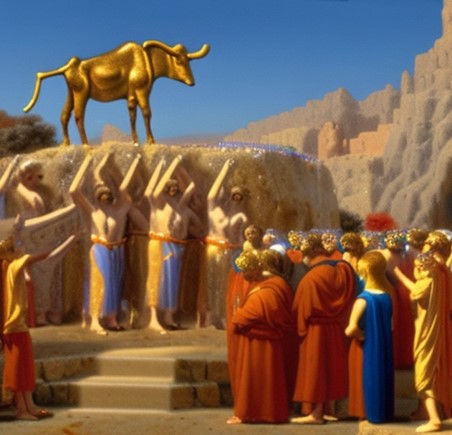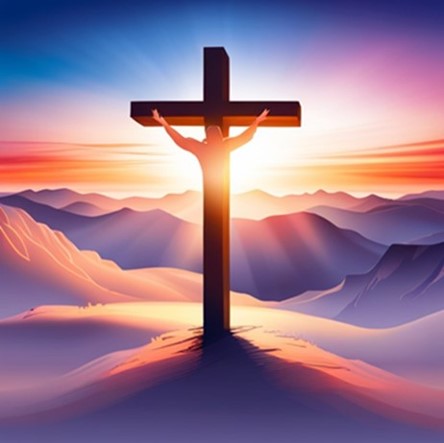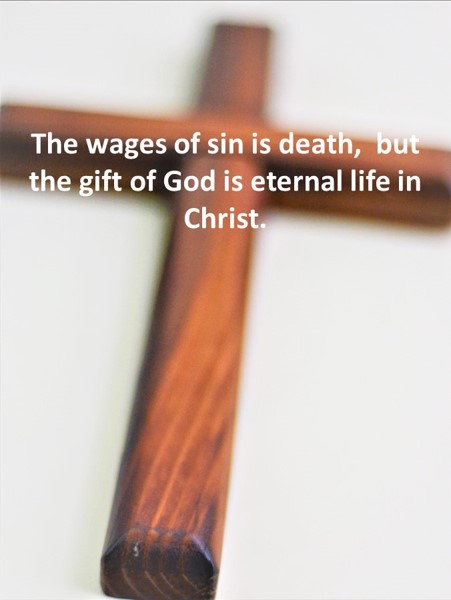Good morning!
Greetings in the name of the Father, the Son, and the Holy Spirit.
“For all have sinned and fall short of the glory of God.” – Romans 3:23
“For the wages of sin is death…” – Romans 6:23a

The narrative of the golden calf in Exodus 32 is more than just a historical account of Israel’s wilderness journey; it’s a mirror reflecting the human condition and God’s profound response to it. We’re brought face-to-face with a palpable tension—a God who is just, displaying righteous anger at the sins of His chosen people, juxtaposed against the same God who overflows with mercy, offering a path to redemption even in the face of blatant rebellion.
Within this story, we unearth layers of meaning. We observe a people impatient and fickle, quickly turning away from the God who had delivered them from Egypt, to the hollow embrace of a lifeless idol. This idol, the golden calf, is not just a relic of an ancient culture; it symbolizes the many gods we, in contemporary society, often prioritize over the true God. Wealth, status, pleasure—our modern-day calves beckon, offering empty promises.
Yet, even as we delve into the depths of Israel’s betrayal and, by extension, our own recurrent failings, rays of hope pierce through. This episode is as much about God’s unfathomable mercy as it is about His justice. It serves as a prologue to the ultimate act of divine love and grace that we find in the New Testament. Today, as we unpack this rich narrative, let’s be open to the lessons it imparts, recognizing our own golden calves and drawing closer to a God who remains steadfast in His love, no matter how often we stray.

The Justice of God:
The biblical account in Exodus 32 reveals a scenario all too familiar to the human heart. The Israelites, finding themselves in a period of waiting, allowed impatience to birth a grievous sin. They created and worshiped a golden calf, an act that brazenly violated God’s commandment, “You shall have no other gods before me” (Exodus 20:3). This wasn’t a mere oversight or minor indiscretion; it was a direct affront to the very essence of their covenant relationship with God.
The gravity of this sin is emphasized by the divine reaction. God’s justice is an intrinsic aspect of His character. He is holy, pure, and cannot be in the presence of sin. Hence, when the Israelites reveled around the golden calf, it wasn’t just an act of idol worship; it was an outright rebellion against the Creator who had graciously delivered them from bondage in Egypt. The people had witnessed firsthand God’s mighty acts and had heard His commandments. Yet, they chose to ignore them in favor of a golden idol.
God’s response was swift and unequivocal. The subsequent judgment—a harrowing scene where three thousand men were put to the sword—serves as a stark reminder of the serious consequences of sin. Sin, in all its forms, is an act of defiance against a holy God, and it carries a hefty price. This truth is echoed in the New Testament when Paul writes in Romans 6:23, “For the wages of sin is death…” It’s a statement not just of physical death but of spiritual separation from God, the source of life and all that is good.
However, it’s essential to understand that God’s justice isn’t a capricious act of anger. Instead, it’s a measured and appropriate response to sin, ensuring the moral balance of the universe. In our contemporary context, we sometimes struggle with the notion of God’s wrath or judgment, preferring to focus solely on His love. While God’s love is unparalleled, overlooking His justice gives us an incomplete picture of His nature. His justice safeguards the righteousness and holiness without which love would have no foundation.
Additionally, the stark contrast between God’s righteous standards and the people’s rebellious actions serves to heighten our understanding of sin’s weight. Sin isn’t merely about breaking a rule; it’s about breaking a relationship. When the Israelites chose the golden calf over God, they were, in essence, trading the eternal for the temporal, the Creator for the created.
In retrospect, the events following the creation of the golden calf are not just an Old Testament narrative. They present timeless truths about humanity’s proclivity to choose the ephemeral over the eternal, to prize immediate gratification over lasting relationship. More than anything, the justice meted out by God in this account serves as a sobering reminder: actions have consequences, and sin, left unchecked, can lead us down a path of destruction.
The Mercy of God:
Amidst the backdrop of blatant rebellion and swift divine justice, an astonishing facet of God’s character shines through: His mercy. After the golden calf incident, as Moses stood before God, the gravity of Israel’s sin weighed heavily upon him. The Israelites had forsaken their Deliverer, yet Moses, exemplifying the heart of an intercessor, pleaded with God for their lives.
God’s response to Moses’s plea is profound. Despite the heinousness of the people’s actions, God showed restraint, embodying the very essence of mercy. Mercy, in its core, is not giving someone what they rightly deserve. By this definition, God’s decision to relent from the disaster He had planned for His people is a powerful testament to His merciful nature.
This revelation of God’s mercy in Exodus should stir our hearts, reminding us of a familiar New Testament message, beautifully articulated in Romans 5:8: “But God shows his love for us in that while we were still sinners, Christ died for us.” This verse encapsulates the greatest act of divine mercy ever manifested: the crucifixion of Jesus Christ. Like the Israelites, we too were in a state of rebellion, deserving of judgment. However, through Christ’s sacrifice, God’s mercy was extended to all, offering redemption and reconciliation.
Dwelling further on this mercy, it’s crucial to note that God’s decision to show leniency wasn’t due to any worthiness on the part of the Israelites. They were guilty, having blatantly disregarded God’s commandments. Yet, it was God’s character, His unwavering mercy, that prevailed. It reminds us of the words in Ephesians 2:4-5, “But because of his great love for us, God, who is rich in mercy, made us alive with Christ even when we were dead in transgressions—it is by grace you have been saved.” God’s mercy doesn’t rely on human merit but emanates from His intrinsic nature of love and compassion.
We find parallels throughout the Bible, reinforcing the theme of God’s mercy amidst human failures. The prodigal son, the woman at the well, Zacchaeus the tax collector — time and time again, we see God reaching out with open arms, ready to forgive and restore.
But why does God display such mercy? Why would He extend such grace to a rebellious people, or to us, for that matter? The answer lies in His unfathomable love. God’s love for His creation is so vast that He continuously seeks restoration over retribution, relationship over retaliation. 1 John 4:10 encapsulates this perfectly: “This is love: not that we loved God, but that he loved us and sent his Son as an atoning sacrifice for our sins.”
In the aftermath of the golden calf, when God could have righteously wiped out an entire nation, He chose mercy. When we reflect on our own lives, the instances of mistakes, misjudgments, and misdeeds, we too can see the hand of a merciful God guiding us back to Him, offering forgiveness and new beginnings.
In conclusion, while God’s justice reminds us of the seriousness of sin, His mercy reveals His heart—a heart that beats with boundless love for humanity, ever desiring our return, and ever willing to embrace us when we do.

The Interplay of Justice and Mercy:
The narrative of the golden calf does more than simply present episodes of sin, judgment, and pardon; it weaves together two seemingly opposing aspects of God’s nature – His justice and His mercy. The harmonious interplay of these characteristics offers a holistic understanding of who God is, and what this means for humanity.
Firstly, it is imperative to understand that justice and mercy are not contradictory, but rather, complementary facets of God’s character. Justice establishes the moral order of the universe, underscoring the sanctity of God’s commandments and the severity of transgressions. Without justice, there would be no accountability or consequence for wrongdoing. As stated in Hebrews 10:30, “For we know Him who said, ‘Vengeance is mine; I will repay.’ And again, ‘The Lord will judge his people.'”
Yet, mercy tempers this justice, adding a dimension of compassion and grace. It’s the hand that holds back the full measure of punishment even when it’s deserved, the embrace that welcomes back the prodigal. James 2:13 poignantly observes, “Mercy triumphs over judgment.”
So, how does this dance of justice and mercy play out in the aftermath of the golden calf?
Initially, God’s justice is evident. Sin has been committed, and a price must be paid. The seriousness with which God views idolatry and rebellion is unmistakably clear. Yet, within this framework of impending judgment, Moses stands in the gap, interceding for the people. His plea becomes the meeting point where justice and mercy converge.
God’s response to Moses is a demonstration of His willingness to temper justice with mercy. Though He had every right to execute judgment, He chose to offer mercy because of His relationship with Moses and His overarching love for the Israelites.
This divine balance reaches its pinnacle in the New Testament. The cross of Jesus Christ stands as the ultimate symbol of the interplay of God’s justice and mercy. In Jesus, God’s justice was satisfied. Sin was dealt with once and for all, as 1 John 2:2 declares, “He is the atoning sacrifice for our sins, and not only for ours but also for the sins of the whole world.” Simultaneously, in the very same act, His mercy was poured out, granting forgiveness and reconciliation to all who believe.
This integration of justice and mercy informs our understanding of God’s dealings with humanity. We live in a world that craves justice, yet simultaneously yearns for mercy. As believers, we are called to reflect this dual nature of God in our lives. Micah 6:8 reminds us, “He has shown you, O mortal, what is good. And what does the Lord require of you? To act justly and to love mercy and to walk humbly with your God.”
But God’s mercy did come without cost, although it was given to us freely. God paid the price by sacrificing His only begotten Son, Jesus Christ, to forgive all our sins. Again, here is the truth about God’s mercy of forgiving our sin:
The wages of sin is death (Romans 6:23a), and without the shedding of blood there is no forgiveness of sins” (Hebrews 9:22b).
In closing, the aftermath of the golden calf illuminates the delicate balance God maintains between justice and mercy. These are not opposing forces but united aspects of His divine character. As we navigate our faith journeys, let’s embrace and reflect both God’s righteous standards and His unfailing compassion, understanding that in Him, justice and mercy are perfectly and beautifully intertwined.
Conclusion and Message from God:
The saga of the golden calf is not just a historical account of the Israelites’ wilderness journey; it serves as a mirror reflecting the deep-seated tendencies of our own hearts. The juxtaposition of God’s justice and mercy in this episode provides profound insights that are relevant to our contemporary lives.
Like the Israelites, we often find ourselves crafting our own “golden calves,” albeit in modern forms. These might not be molten images, but they manifest as materialism, personal ambitions, unhealthy relationships, or other pursuits that take precedence over our relationship with God. The consequence of these actions, though sometimes subtle, is a distancing from God’s presence, a spiritual estrangement caused by our choices.
However, the story doesn’t conclude with God’s wrath or our shortcomings. It’s brilliantly illuminated by the beacon of God’s mercy. Even when we err, His love remains steadfast, reaching out to us in the midst of our failures. The essence of the gospel resonates in this: while we were still entrenched in sin, Christ’s sacrifice bridged the chasm, offering reconciliation. Paul captures this beautifully, stating, “But God demonstrates His own love toward us, in that while we were still sinners, Christ died for us” (Romans 5:8).
How then should we respond to this profound revelation of God’s character? Firstly, by recognizing and dismantling the idols in our lives. A conscious, daily decision to prioritize God and His commandments is paramount. Moreover, having experienced God’s mercy, we ought to become its vessels, extending it to those around us, mirroring God’s grace in our interactions.
In summary, the aftermath of the golden calf incident imparts a two-fold lesson: the serious consequences of sin and the overwhelming grace of God. As we navigate our lives, may we remain conscious of these truths, endeavoring to live in alignment with God’s will. Embracing His mercy, let’s become reflections of His love, demonstrating to the world the transformative power of a life touched by divine justice and grace. God is good. Yes, He is always good to us!

“Where sin increased, grace abounded all the more.” – Romans 5:20b
“But the gift of God is eternal life in Christ Jesus our Lord.” – Romans 6:23
